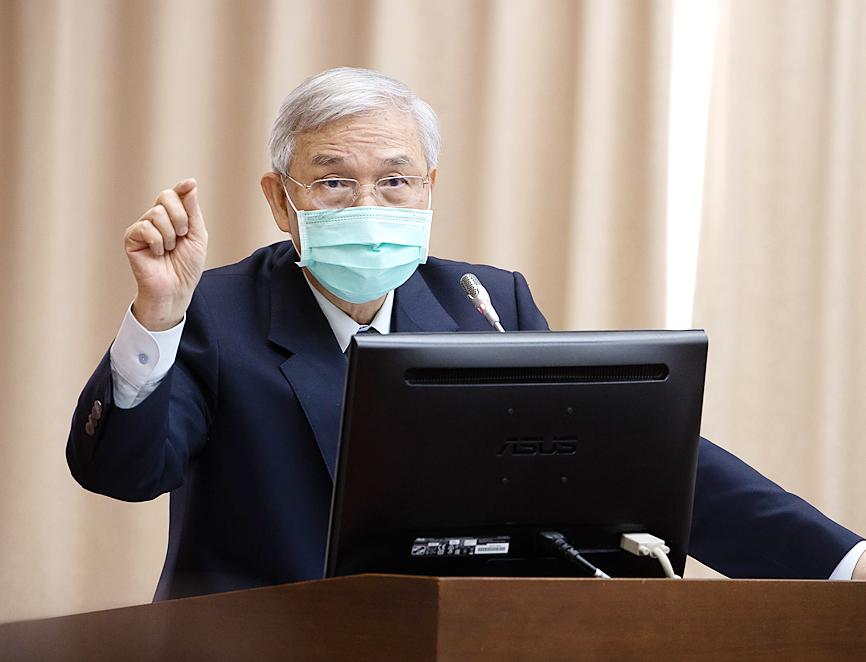Taiwan will not follow the US in setting its monetary policy, but it would pay attention to global peers’ moves, international raw material price trends and geopolitical risks, central bank Governor Yang Chin-long (楊金龍) told a meeting of the legislature’s Finance Committee yesterday.
“There is no need for Taiwan to follow the US monetary decisions,” as the US Federal Reserve is widely believed to raise interest rates by 50 basis points next month in another of six more rate hikes for this year to curb inflation, Yang said.
US inflation last month hit 8.5 percent, while Taiwan’s rose 3.27 percent, rendering drastic rate hikes unwarranted, he said.

Photo: CNA
Rather, the central bank will approach the matter by taking into consideration policy moves by global peers, inflationary pressures at home, and international fuel and raw material price movements, he said.
In addition, the central bank will seek to support the nation’s economy to meet its duty, he said.
Yang said he stood by the view that Taiwan could achieve a GDP growth of 4 percent this year, although international research bodies have cut their forecast to an average of 3.8 percent after Russia invaded Ukraine in February and crude prices have since shot up.
Consumer prices in Taiwan are likely to ease next quarter, although the landscape is teeming with uncertainties, Yang said.
The central bank will make its quarterly decisions guided by the latest global and domestic economic data, Yang said, while acknowledging that the ongoing weakening of the New Taiwan dollar against the greenback is lending force to inflation.
Consumer prices picked up 0.1 to 0.17 percentage points after the NT dollar recently softened from NT$28 to NT$29 versus the US currency, Yang said, describing the extra inflationary burden as moderate.
A weak NT dollar will not necessarily become a norm, but has much to do with global funds responding to the Fed’s rate hikes and asset adjustments, he said.
“The market will have the final say on the NT dollar’s movements, but it remains the best performer in the past two years, thanks to Taiwan’s robust economy and corporate profitability,” Yang said.
The governor reiterated that the rate hike on March 17 is not aimed at cooling the property market, even though it inevitably sent unfavorable messages.
The central bank would favor selective credit controls to prevent funds from overflowing to the property market, he said.

MULTIFACETED: A task force has analyzed possible scenarios and created responses to assist domestic industries in dealing with US tariffs, the economics minister said The Executive Yuan is tomorrow to announce countermeasures to US President Donald Trump’s planned reciprocal tariffs, although the details of the plan would not be made public until Monday next week, Minister of Economic Affairs J.W. Kuo (郭智輝) said yesterday. The Cabinet established an economic and trade task force in November last year to deal with US trade and tariff related issues, Kuo told reporters outside the legislature in Taipei. The task force has been analyzing and evaluating all kinds of scenarios to identify suitable responses and determine how best to assist domestic industries in managing the effects of Trump’s tariffs, he

TIGHT-LIPPED: UMC said it had no merger plans at the moment, after Nikkei Asia reported that the firm and GlobalFoundries were considering restarting merger talks United Microelectronics Corp (UMC, 聯電), the world’s No. 4 contract chipmaker, yesterday launched a new US$5 billion 12-inch chip factory in Singapore as part of its latest effort to diversify its manufacturing footprint amid growing geopolitical risks. The new factory, adjacent to UMC’s existing Singapore fab in the Pasir Res Wafer Fab Park, is scheduled to enter volume production next year, utilizing mature 22-nanometer and 28-nanometer process technologies, UMC said in a statement. The company plans to invest US$5 billion during the first phase of the new fab, which would have an installed capacity of 30,000 12-inch wafers per month, it said. The

Taiwan’s official purchasing managers’ index (PMI) last month rose 0.2 percentage points to 54.2, in a second consecutive month of expansion, thanks to front-loading demand intended to avoid potential US tariff hikes, the Chung-Hua Institution for Economic Research (CIER, 中華經濟研究院) said yesterday. While short-term demand appeared robust, uncertainties rose due to US President Donald Trump’s unpredictable trade policy, CIER president Lien Hsien-ming (連賢明) told a news conference in Taipei. Taiwan’s economy this year would be characterized by high-level fluctuations and the volatility would be wilder than most expect, Lien said Demand for electronics, particularly semiconductors, continues to benefit from US technology giants’ effort

‘SWASTICAR’: Tesla CEO Elon Musk’s close association with Donald Trump has prompted opponents to brand him a ‘Nazi’ and resulted in a dramatic drop in sales Demonstrators descended on Tesla Inc dealerships across the US, and in Europe and Canada on Saturday to protest company chief Elon Musk, who has amassed extraordinary power as a top adviser to US President Donald Trump. Waving signs with messages such as “Musk is stealing our money” and “Reclaim our country,” the protests largely took place peacefully following fiery episodes of vandalism on Tesla vehicles, dealerships and other facilities in recent weeks that US officials have denounced as terrorism. Hundreds rallied on Saturday outside the Tesla dealership in Manhattan. Some blasted Musk, the world’s richest man, while others demanded the shuttering of his